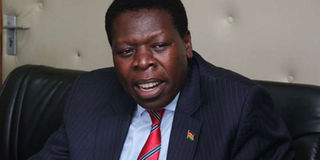Annual devolution conference should address concerns on development

Devolution Cabinet Secretary Eugene Wamalwa addresses a press conference in Nairobi on January 31, 2018. The Fifth Devolution Conference should provide an opportunity to address major concerns. PHOTO | KANYIYI WAHITO | NATION MEDA GROUP
What you need to know:
- The first elections held in 2013 under the 2010 Constitution heralded a historic moment and development in governance.
- Devolution has been described as the paradigm shift in the management of public affairs.
The Council of Governors (CoG) is in the process of organising the fifth Annual Devolution Conference to showcase the achievements of devolution.
This time around, the conference will be held in Kakamega County, at the Kakamega High School grounds, from April 23 - 27.
Since the first Devolution Conference was held in Kwale in 2014, it has become an annual event, gaining traction with a number of stakeholders, including the national government, the private sector and even the civil society.
FEEDBACK
And while the private sector has always seized the platform created to endear itself to the second layer of government and market their goods and services, to the civil society, these meetings provide an extraordinary opportunity to give feedback on service delivery by county governments.
Despite the challenges that ordinary Kenyans face with the devolved governments, they seem to have kept some faith in the promise that devolution holds.
Indeed, to many Kenyans, the first elections held in 2013 under the 2010 Constitution heralded a historic moment and development in governance.
We all recall how the infamous Sessional Paper No. 1 of 1965 on African Socialism and its Application to Planning in Kenya is blamed, and rightfully so for the inequalities, marginalisation, and the high sense of ethnic consciousness we face in Kenya today.
The sine qua non of Sessional Paper No. 1 as a development policy framework was that the central government would place its development investments in regions of high potential, and share the produce with less yielding regions.
NATIONAL UNITY
And with that came the stereotypes of those who work and those who are lazy.
We also remember the experiments with the District Focus for Rural Development, when the District Commissioner was all manner of things rolled into one.
He was the security boss, the returning officer of elections and the chairman of all development initiatives.
It is this lopsided notion of development that the 2010 Constitution sought to address.
Devolution, as set out in Chapter 11 of the Constitution, has been described as the paradigm shift in the management of public affairs, seeking to promote national unity while also recognising that we are as diverse as any society can be.
PRIORITIES
It is all rooted in our colonial history and heritage, having suffered together as inhabitants of the territory that British colonial occupants cobbled together.
Such is the common heritage that we share as a people that when leaders, including some governors, make reference to sections of the community that live in certain counties as “foreigners who deserve no services”, we are left cringing because that is the exact opposite of what devolution was meant to achieve.
We hope that the Fifth Devolution Conference will provide an opportunity to address some of these concerns.
Suba Churchill is the Presiding Convener of the Civil Society Reference Group, [email protected]





